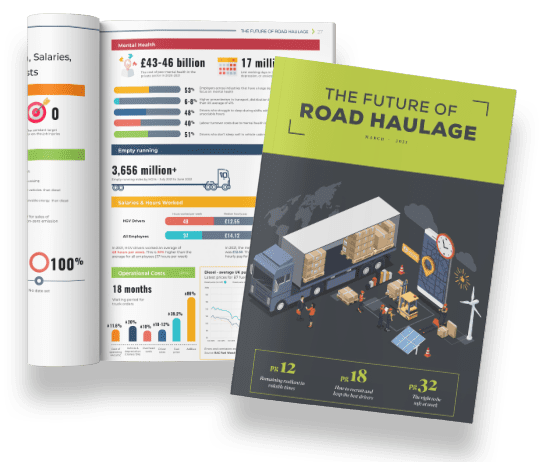The Vital Role of Freight Exchanges in Supply Chains
In the world of logistics and supply chains, there’s a crucial tool that keeps things running smoothly: freight exchanges. These digital platforms play a vital role in making sure goods get from point A to point B efficiently. In this article, we’ll explore how freight exchanges help businesses save time and money while keeping products moving smoothly.
What is Freight Exchange?
Freight exchange also known as haulage exchange, return loads or back loads is an online platform that plays a crucial role in the logistics and haulage industry. It serves as a digital marketplace where various stakeholders in the transport sector can trade haulage loads, connect, collaborate, to achieve greater efficiency and profitability.
How does Freight Exchange work?
At its core, a freight exchange acts as a central hub where haulage companies, shippers, distributers, manufactures, and freight forwarders come together to trade loads. When a haulage company has excess loads that cannot be accommodated by its own fleet, they can list these loads on the exchange. The listing typically includes details such as the type of cargo, required vehicle specifications, pickup and delivery locations, and other relevant information. Interested carriers and owner-operators then can bid on these loads or express their interest in transporting them.
Benefits of Freight Exchange
Here are some of the benefits of freight exchange for the haulage industry:
1) Boosting Efficiency
For hauliers with available capacity, a freight exchange offers an avenue to find additional work. They can search for jobs that align with their specific capabilities, whether it involves specialised equipment or certain accreditations. This targeted approach allows them to optimise their fleet utilisation and reduce empty running costs, a critical factor in ensuring the profitability and sustainability of their operations.
2) Reducing Empty Running Costs
Efficiency in the haulage industry is closely linked to sustainability. Empty running costs, where trucks are on the road without a load, contribute to increased fuel consumption and emissions. Freight exchanges play a significant role in mitigating this issue by having an easy to use and accessible location to find backloads for the journey home, thereby reducing empty miles travelled and the associated environmental impact.
3) Pricing Flexibility
The pricing of haulage work secured through a freight exchange is determined through negotiations between the haulier and the customer. The exchange itself does not dictate prices but provides a platform for members to engage in pricing discussions. This flexibility allows for competitive pricing arrangements that benefit both parties involved.
4) Trust and Accountability
One of the key advantages of using a freight exchange is the ability to work with a network of trusted hauliers. Members can review company profiles and read reviews left by others on the platform, ensuring they choose partners that align with their specific needs and objectives. Accreditations and specialisations can also be verified, adding an extra layer of confidence and peace of mind in the selection process.
5) Streamlined Invoicing and Documentation
Freight exchanges often offer tools to streamline administrative tasks. Invoices are typically handled directly between members, reducing paperwork, and simplifying the billing process. Many exchanges also provide mobile apps that facilitate delivery status reporting and electronic proof of delivery (ePODs), reducing administrative burdens, handling of paperwork and much saved time.
Digital Transformation in Haulage
The digitalisation of the haulage industry has become increasingly important. Freight exchanges like Returnloads.net have adapts with industry challenges, providing a platform for hauliers to continue working efficiently and effectively, even under unconventional circumstances.
Supporting the Supply Chain
The freight exchange industry has emerged as a pivotal component of the broader supply chain. It ensures the smooth flow of goods across the UK and Ireland by connecting businesses with the transportation services they need. In an industry that is essential for the functioning of economies, freight exchanges help maintain a critical lifeline for goods distribution.
Frequently asked questions about freight exchanges
Here are some of the commonly asked questions about freight exchanges.
1) Are freight exchange platforms only for full truckload (FTL) shipments?
No, many freight exchange platforms cater to various shipment sizes and types, including less-than-truckload (LTL), partial truckloads, and even specialised cargo.
2) Is it safe to use freight exchange platforms?
Reputable freight exchange platforms like Returnloads.net prioritise safety and security by verifying the identity and credentials of users. However, it’s essential to exercise due diligence and research the platform’s reputation and policies before using it.
3) Do I need any special equipment or software to use a freight exchange platform?
Most freight exchange platforms, such as Returnloads.net, are web-based and accessible through standard web browsers. Users typically need an internet connection and a computer or mobile device to access and use the platform.
4) Are there fees associated with using freight exchange platforms?
Yes, many platforms charge fees for using their services. These fees can be subscription-based, transaction-based, or a combination of both. The specific fee structure varies between platforms. Returnloads.net offer a very competitively priced subscription service in the market.
In conclusion, a freight exchange is more than just a digital marketplace for load trading; it is a catalyst for efficiency, sustainability, and collaboration within the haulage industry. It empowers businesses to make informed decisions, reduce operational costs, and contribute to a more streamlined and sustainable logistics ecosystem.

